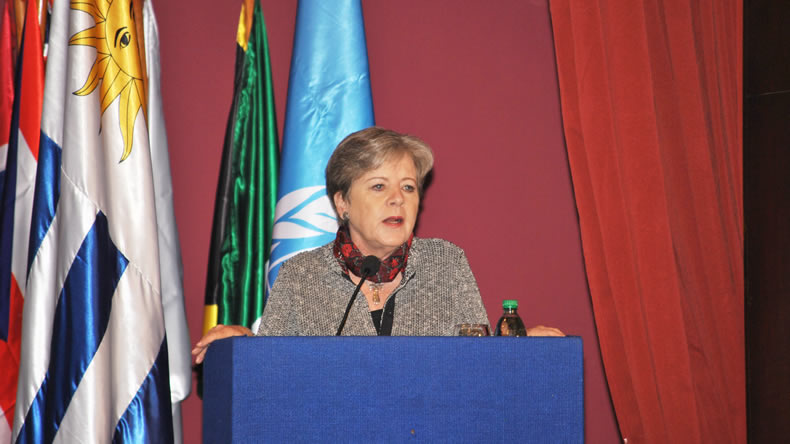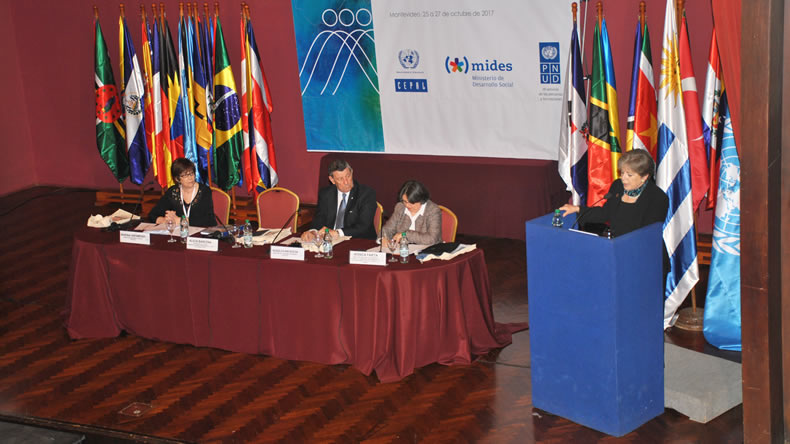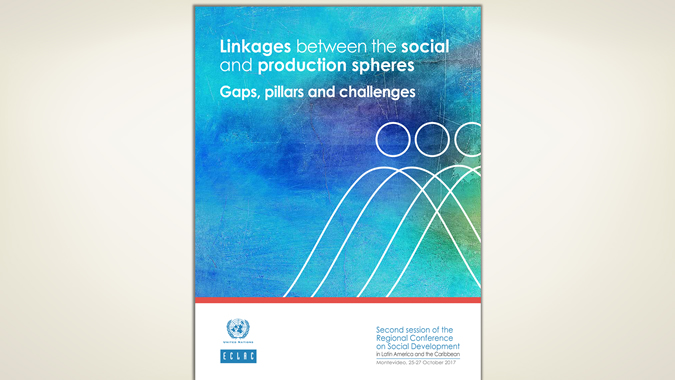Alicia Bárcena: “We Must Advance toward a Regional Agenda on Inclusive Social Development on the Road to 2030”
Work area(s)
ECLAC’s Executive Secretary presented the document “Linkages between the social and production spheres: Gaps, pillars and challenges” to regional authorities.

Alicia Bárcena, Executive Secretary of the Economic Commission for Latin America and the Caribbean (ECLAC), called today for progress in designing a regional agenda on inclusive social development that would allow countries to achieve the Sustainable Development Goals (SDGs) contained in the 2030 Agenda, which was approved by the international community in 2015.
ECLAC’s most senior representative presented the position document Linkages between the social and production spheres: Gaps, pillars and challenges, which is the subject of debate at the Second Meeting of the Regional Conference on Social Development in Latin America and the Caribbean, being held from Wednesday, October 25 to Friday, October 27 in Montevideo, Uruguay.
The Commission’s new study addresses the dual challenge of social and labor inclusion, which entails accessing the benefits of development and enjoying the full exercise of rights. According to data from 2015, just 3 in 10 households in Latin America are in a situation of dual inclusion, despite progress between 2002 and 2014.
Comments on the presentation were made by Peru’s Minister of Development and Social Inclusion, Fiorella Molinelli, and Uruguay’s Minister of Social Development, Marina Arismendi, who praised this substantive contribution by ECLAC and adhered to its main conclusions.
The regional social development agenda, said Bárcena, must include the eradication of poverty, hunger and malnutrition; the elimination of intersecting inequalities (socioeconomic, gender, ethnic-racial, territorial and age-related); the universalization of health and education; the achievement of gender equality and autonomy for women, as well as of productive, decent work; the construction of universal social protection systems; the promotion of public investment; and the consolidation of institutions that allow for coordinating policies aimed at the dual social and labor inclusion of the population.
In the current context of low growth, the senior UN official called for protecting social gains and preventing rollbacks. After the crisis of the 1980s, she recalled, per capita GDP in Latin America and the Caribbean took 15 years to recover (it was only in 1995 that it reached the levels of 1980), while poverty levels took 25 years to recover.
Among the proposals for financing the 2030 Agenda, Bárcena mentioned safeguarding investment and social public spending, fighting tax evasion and illicit flows, incentivizing private financing, relieving the foreign debt of Caribbean small island States, and redefining the criteria for middle-income countries toward countries in transition.
“Tax evasion is the clearest expression of the culture of privilege,” underscored the Executive Secretary. In 2015, expenditure on conditional cash transfer programs (CCTs) represented 0.33% of regional GDP, while tax evasion amounted to 6.7% of GDP, she indicated.
According to recent estimates, both the coverage of and the investment in CCTs increased considerably in the region during the decade of the 2000s, stabilizing after 2010 and experiencing declines in 2014 and 2015, she said.
Bárcena emphasized that the region requires “growth to attain equality and equality to grow” through macroeconomic management that mitigates volatility, fosters productivity and favors inclusion, and through productive dynamics that close domestic and external gaps.
A better and more efficient State is needed to redistribute, regulate and oversee, and to build social consensuses that extend beyond short-term political-electoral borders, she concluded.
Related content

ECLAC: Dual Social and Labor Inclusion is Indispensable for Avoiding Rollbacks
The Second Meeting of the Regional Conference on Social Development in Latin America and the Caribbean was inaugurated on Wednesday and will run through Friday, October 27.

ECLAC: Despite progress, 7 out of every 10 households in Latin America do not reach minimum levels of simultaneous social and labor inclusion
The United Nations regional organization presents a new study in the framework of the Second Meeting of the Regional Conference on Social Development, which begins tomorrow in Montevideo, Uruguay.
Related event
Subregional headquarter(s) and office(s)
Type
Country(ies)
- Latin America and the Caribbean
-
Uruguay
Related link(s)
Contact
Public Information Unit
- prensa@cepal.org
- (56 2) 2210 2040


